QuestionQUESTION: My husband and I rescued a 2yr old standard male poodle, Fred, a month ago
from a micro-breeder (a term I use to refer to families who breed dogs from
their home). The micro-breeder purchased him at 4 months of age from a
reputable breeder to be used as a "stud". Unfortunately, he was not interested
in the females and they accounted that to his low sperm count. We, on the
other hand (and our vet who neutered him) think his lack of breeding success
was due to his emaciated condition. When we met him, you could easily feel
his bones. My husband and I speculate that the other dogs were eating Fred's
share of the food since he is such a subservient dog. When we arrived, was
hiding in the bushes and gradually came out to investigate our dog Honey
(who we'd brought along with us to meet Fred). Fred clung to us like glue...
being very weary of the owner. We adopted him there.
For the past months, we have been nurturing him back to health and is
showing progress. Unfortunately, he does have a tendency to hide in corners,
under chairs, behind bushes, etc... If you raise your hand above your waist, he
cowers. If you make any sudden movements, he tries to run away. If you
make any loud noises, drop an item, close a door, laugh, anything that goes
above a certain pitch, he cowers or tries to run away. He will not take any
treats and will only eat when you are out of the room and has a tendency to
eat all his food at night time instead of the daytime. In addition, we have to
separate the two dogs at night to prevent Honey from eating his food, which
she like to do for some reason. It's quite a dichotomy, but when we bring him
to the dog park, he perks up and just loves to run and socialize with the other
dogs AND people. However, when it comes to going home, he will rarely
respond to our commands (although he recognizes his name) and we usually
have to get someone else to call him to come, and hold him while we attach
his leash. It's a trust issue, and it appears that whomever is in control, he
distrusts. He seems to trust strangers readily, and is especially distrustful of
me, and slightly less so of my husband. When he does come to me, it is
almost in a crawl - he makes himself as small/close to the ground as
possible. He will sometimes let me pet him under his neck (where our vet
recommended we pet him to boost his confidence), but sometimes he will
turn his head away.
Since his adoption, he has gained his strength and responds to our call about
25 of the time. He is gradually trusting us. He and Honey play joyfully in the
yard and at the dog park. The two are inseparable. However, you get him in
the house and it's a complete reversal. He runs to his corner and rarely leaves
that spot. Although his health is improving, his progress is a roller coaster.
One day he is happy as can be, tail raised and playing with Honey in the yard.
The next day, he can be depressed and none responsive to our commands....
we essentially have to start all over to gain his trust, despite not doing
anything (that we are conscious of) to loose his trust. He will not leave his bed
area unless you attach a leash to his collar or his harness.... strange. It is
very hard to even get him to come out for a walk (we have to coax him out or
even pick him up and carry him to the door), though once he is out walking
he seems to like it - though he generally has his tail tucked under him when
walking, with it loosening/relaxing as we walk, but not up and wagging (the
way it wags when he is running off leash).
Although we have ample experience in dealing and training an insecure dog
(i.e. Honey, who after 2 years now trusts us completely, but who was a happy
dog when we rescued her), we just need some good advice as to what we can
do to get Fred out of his shell and to trust us completely. We understand that
this will take some time but we also want to make sure we are training him in
the right direction. Recently, he has begun to pee in the house. What do you
do in such a case? You can't chastise him since he will cower away and you
will loose all that progress you have worked so hard to gain his trust but at
the same time, he needs to learn that the house is not a bathroom.
We are at a stage where we need some professional advice and training. We
took Fred to a group training session which turned out to be a waste of time
since their focus was on either positive reinforcement training through treats
(he does not take treats) which will not work on such a timid dog. He actually
gets more scared when offered a treat, and turns his head away.
If you have any insights, please share them - we will appreciate them!!
Thank you.
ANSWER: Positive reinforcement training does not depend on treats, but rather a conditioned cue. This cue can be conditioned using food or any object the dog finds attractive: the cue (clicker or visual signal like putting finger tip to nose) becomes the reward (primary reinforcer) in the dog's mind after its conditioning. The actual reward (which is now secondary) can be food or a toy. Dogs that are fearful or anxious will not accept treats; your dog is not eating during the day when you are up and about, but waiting until night time. He may be too stressed to eat, but that situation might CHANGE outdoors (as you report he seems quite different at the dog park, etc.) His "turning his head away" is a natural behavior in a dog that indicates submission: this dog does not feel "important" enough or confident enough to bait (accept a treat) and is indicating his very low rank by turning his head and/or refusing the treat. He is psychologically blitzed. A group training environment, if conducted properly, would actually be a wonderful learning experience for this dog, who seems to like other dogs and even people when not confined (to the house.) I wouldn't be so quick to give up on it; so long as the trainer is experienced, does NOTHING to force the dog or coerce the dog, and is even willing for the dog to sit on the sidelines and observe, I would continue to take him. Dogs learn from observing other dogs; for him to see other dogs in this training venue who are working for the clicker (although he is not a candidate for the clicker, he needs a visual signal: finger to tip of nose), he will begin to develop confidence in the training regimen and will actually acquire some part of the trained behaviors he is observing.
This dog has been subjected to serious psychological and physical abuse. My first reaction would be to notify the humane society in your area and alert them that this "micro breeder" (I have a better name for her but I'll refrain from using it) is abusing her dogs. A surprise visit by a humane society law enforcement officer might work wonders, Fred can't be the only one being neglected and abused. This won't help Fred but it'll make me feel a whole lot better.
His 'failure' as a stud was most likely due to his enormously low rank in the household; not only did the human (if you can call her that) abuse him, but he was apparently an omega in the pack (if indeed the other dogs ate his food and his temperament did not allow him to protect it.) It's also possible the miscreant breeder didn't feed him when he wouldn't "perform". A dog that is so seriously psychologically demoted will not breed, it's a behavior artifact from the grey wolf lo these many millions of generations ago: the Poodle is closest to type in terms of genetics.
Before proceeding further, let me address the indoor urination (in case I forget.) Fred is reacting to the experience of being led (or carried, even worse) outdoors (where he must eliminate); he doesn't have anywhere near the confidence to signal that he needs to go out and being physically removed to the outdoors is most likely creating a serious approach avoidance issue: he needs to go out but he's afraid. His refusal to leave his bed is not at all strange, it's a freeze response. This dog is absolutely terrified in your home and it has nothing to do with you, it has to do with what went on in that miscreant's household, not only with the humans, but among the dogs. Praising and rewarding his elimination outdoors while IGNORING his accidents in the house is the only way to go with this dog. An angry response at inappropriate elimination never works; dogs repeat behaviors that are rewarding for them and slowly the conditioning takes place and the dog chooses to eliminate outdoors.
You report that Fred seems to be coming around somewhat (he's only been with you for a month!) indicates that he waivers: goes from happy one day to depressed and hiding the next. This is to be expected; this dog is going to take many months of rehabilitation before you begin to see his normal, happy and confident self (which you can already see in the dog park, a totally new experience around which he has not acquired any negative conditioning.) Everything you see in your home, all the avoidance and fear behaviors, is a conditioned response to his former living arrangement. His apparent fear of you is a result of the former life; his fear of restraint in the home (being placed on leash) is a response to severe abuse in the former life (where he may have been dragged around, I wouldn't put anything past that individual.) A great deal of anger and frustration appears to have been taken out on this dog in his former life, for his basic temperament seems quite upbeat and confident: he has been beaten into the ground psychologically.
Continue as you are, only less so: no loud noises, no sudden moves; NO direct eye contact at all for any reason (very dominant), no bending over the dog, NO picking the dog up (extremely dominant), DO NOT walk directly toward him, instead walk toward him on a curve; when you approach him on a curve, lick your lips and watch his return signal (this is a stress reduction signal); yawn (by gaping slowly) if he seems very stressed around you. CHANGE HIS NAME. This dog must have seriously bad associations with that name (if it's the one he came with). Read Turid Rugaas book on calming signals and visit her site:
http://www.canis.no/rugaas/index.php
Use your other dog in the house as an example of your fair and loving leadership: hug her, interact with her, work with her in small obedience behaviors (like "sit") for reward (and here's where you learn about positive reinforcement training and the VISUAL SIGNAL: condition her to it IN FRONT OF Fred and work with her IN FRONT OF Fred). Learn about it at ClickerTraining.com but remember DO NOT use a clicker, use the finger to tip of nose instead. Your best approach might be one used with deaf dogs, since no sound is involved at all (and Fred is so sound sensitive). You can check it out at:
http://www.deafdogs.org/training/clicker.php
You won't be using this method with Fred for a while (in the house at least) but as he observes your other dog and yourself working together, his confidence in you will increase and he WILL learn about the cue (visual signal) and the basic commands. DO NOT EXPECT THIS DOG to come to you when you call him: don't even try. It's going to take a great deal more trust and a great deal more time before you can even begin to shape a recall.
You can't put this dog on indoor leash (house tab) because of his very strong fear of restraint; you must allow him to approach you and interact with you at HIS SPEED. Use every calming signal you can learn; walk toward him on a curve; no direct eye contact; no picking him up or physically restraining him (hugging) right now; allow him to have his space. He is WATCHING you all the time, every second, even though he may not appear to be doing so. Try backing up to him with something special (like a piece of chicken frank) and drop it in front of him, then walk away. Do this until he understands what backing up to him means (you'll know this easily) and then stop a half foot away and just leave your hand extended behind you, palm up, with the treat in it: see if he gets bold enough to take it. He must learn you can be trusted all the time, that you are NOT dominant or attempting to dominate him in any way, that he will not be hurt or frightened intentionally (dogs can tell the difference between an accidental toe squish and an intentional one), tell everyone else in the house to proceed as you are, do not rush this dog. Short term medication to alleviate anxiety may be necessary if you don't see some result in the next few weeks, but I expect you WILL see results (I think you already are seeing them, per your report.)
Please stay in touch, repost as often as you like with any questions you have.
---------- FOLLOW-UP ----------
QUESTION: Thank you so much for your very thoughtful and detailed response to my
questions about Fred (whose name I will change, thank you for the
suggestion). You are right that he is watching me all of the time - he is
constantly staring at me with a fixed gaze. Whenever I come into the room
he freezes and retreats to his corner (for example, yesterday he was drinking
from his bowl in the living room and I walked past the doorway and he
stopped and hid behind his bed.)
He continues to urinate indoors, and the strange thing is that he seems to do
it when he hears me open the front gate/recognizes that it is me coming to
the house. I've only left him for two hours at a time (with Honey my other
dog), and I arrive back to fresh puddles on the floor. I haven't scolded him at
all about this, I just have him go outside, where he'll run to his hiding place
behind a big pine tree. I try to speak softly as I come through the front gate
and through the front yard, but his response is still to pee.
I will use your suggestions about how to approach him (walking around not
towards him, not looking at him, licking my lips and yawning). I tried them
today, and he still wouldn't come off his bed, so the only way I can get him to
come outside is to use a leash and harness at this point. I attach it, put his
front paws on the wood floor (off the bed) while not looking at him (and
approaching him from the side), then give two short pulls on the leash (again
not looking at him), and he gets up and walks/slinks with me to the front
door and outside. Is it detrimental to attach the leash indoors in this manner?
Otherwise, I don't know how to get him outside in the meantime while
working on the calming behaviors you suggested as alternatives to getting
him to come out with me.
I worry that I remind Fred of the breeder he came from - as he seems to be
most wary of me, moreso than of my husband, or anyone else he's met while
with me. I've tried to change the pitch of my voice when around him (as he
seems to respond negatively to even hearing me speak). I hope that he grows
to trust me, and I will work hard at this. Thank you again so much for your
thoughtful and useful responses. I will let you know how things progress
with Fred.
ANSWER: The urination you describe is not voluntary; this dog is so fearful that he is losing control of his bladder. This is an abomination; to think what he must have been subjected to nauseates me. You are working quite hard to help "Fred"; you can't learn too much. Read Turid's book and Patricia McConnell Ph.D.'s book "For The Love of A Dog". Proceed with positive reinforcement with Honey in front of Fred (using the finger to nose approach). You have no choice but to attach the leash to the harness indoors, you can't take the chance the dog will bolt. Back up to him, don't make eye contact, don't bend over (get down on his level). I'm working with a woman who adopted a Spanish Greyhound rescue from the most horrific and barbaric serious abuse and outrageous murder of dogs used for "hunting" by tourists in Spain, and THAT dog is in better psychological shape than Fred is!! PLEASE report this "breeder" to the humane society! And keep me updated.
---------- FOLLOW-UP ----------
QUESTION: Thank you for your insightful advice about the standard poodle we "took"
from a goldendoodle breeder in January.
We've made some progress, but seem to be moving backwards now. He is
still very much afraid of me (as I he associates me, the primary care giver with
his former female primary caregiver - if you could call her that!), though I
have modified my behavior (I no longer pick him up, we give him constant
access to his crate (which we've been closing at night) I approach him from
the side, I try not to look directly at him, I only pet him when I am sitting at
his level and breathing slowly and deliberately, and I praise him when he
makes a "calming signal", and of course when he goes potty outside. I tried
with putting my finger to my nose as an alternative to clicker training, but he
gets anxious whenever I raise a hand. I have not punished or scolded him at
all, even when he does something I see as wrong (i.e. poop in the house).
Most problematic is that he is too afraid to leave his crate or go outside to go
relieve himself. Last night, he cried twice, and I took him out of his crate
twice and over to the open door, but he would not go outside. He just stood
on the threshold and wouldn't budge. I thought maybe he'd had a bad
dream, and that it wasn't a bathroom call - but it turned out in the morning
that it was - and he'd pooped all over his crate. I felt so sad for him -
cleaned it up, put him outside, went for a walk with him and my other dog,
then gave him a bath. I wish he felt comfortable enough to go outside - as I
hate having to force him out if he doesn't want to go - I want him to be able
to simply get up and go out!!
He gets so scared still when I try to get him out of his crate, and he cannot
comfortably stand in the middle of the room. The minute we get in from a
walk and I've dried off his feet, he bolts either to his crate or to his other safe
zone underneath the desk in my office.
It is still me that he is primarily scared of - as he will lean all of his weight on
anyone else when we go walk (he never leans on me unless I am sitting
quietly with him or cleaning his paws after a walk). He will only come to me
when he has his long lead on - and he always circles around to my backside
when he approaches, and doesn't sit - but cowers. Also, his expression never
changes, it is always a wide eyed frightened look, which stands in sharp
contrast to our other dog who smiles, softens her eyes and has several facial
expressions to communicate with us. He's lost much of his dog language,
which is so very sad. He doesn't even shake himself off after being bathed,
he just lets the water soak on him - though he will shake himself off at the
beach.
My husband suggested that I should try ignoring the dog, as maybe my
constant attention makes him uncomfortable.
I hired a behaviorist to work with Red for one session (all I can afford!), which
was quite helpful - and I've followed her suggestions (which were along the
lines of Turid Rugas' book on calming signals in dogs), which worked for
almost a week, but it seems like he is just as afraid of me now as when I first
wrote to you. She also thought he'd been abused, probably had things
thrown at him or was hit with the leash, in addition to psychological abuse)
He is somewhat different when I take him to work, and even waggled his tail
and watched me when I came back to my desk. Also, when I walk him at
work (on a leash), his tail sometimes goes up, and it's never up when we go
walking (on a leash) to the local dog park. Its only when he's off leash that
his tail goes up, and when he's bolting from the entry way to his safe zone
under my office desk or to his hiding place in the yard (when I finally do
manage to get him out). I have a very hard time getting him back to me
when he is offleash at the dog park, but that seems to be the only time he's
happy so I want to be able to let him run free - but realistically I should keep
him on the leash at all times.
At this point - I would love to be able to open the door and have him walk
outside to do his business, and would especially appreciate any insights for
how to do this. Thank you
AnswerI don't know what date you first asked me a question regarding this dog, but it seems to me far too recent for you to have obtained any real progress. Bathing him is a real problem: all grooming is dominant. Wiping his feet is also a very dominant thing to do (dogs are very protective of their feet.) You persist in doing extremely dominant things; I don't know how well you've absorbed the calming signals in Turid's book because you don't seem to be reading his very well and this appears to be resulting in learned helplessness on his part: if he can communicate with other dogs in the dog park, and he can play with them confidently, and yet he is obtaining more and more fear around you, you're not doing your homework.
The dog may be refusing to go outdoors (when he obviously needs to, I doubt he's choosing to lie in his own poop unless he's been desensitized to it because he was forced to do it for a long time) BECAUSE you are at his side and urging him. Put him on very long training leash; stand indoors; allow him to go out by himself. Or, if you have a fenced yard, just open the door, back away, and allow him out by himself. Your behaviorist should have done far more than just educate you regarding calming signals and giving an opinion regarding the dog's former history. She should have given you clearcut instructions on how to work with this dog to elevate his status in your home, on how to GIVE HIM calming signals (something you should be doing RELIGIOUSLY and Turid's book certainly tells you how to do that), on what NOT TO DO (bathing, wiping feet, anything dominant.) And after reviewing my answers to you I see that I indicated you may need to have your veterinarian assess this dog for medication. This medication could be a beta blocker to truncate adrenaline (fight/flight response) or an overall calming influence (NOT a sedative, something like Clomicalm).
The dog requires months (MONTHS) of rehabilitation. You need to REPORT THIS BREEDER TO THE HUMANE SOCIETY IN YOUR AREA. This miscreant is "breeding" a designer dog for PROFIT and I will bet MY HOUSE that every single dog in her "care" is abused, neglected, not socialized and a candidate for the nearest high kill shelter. You need to find a REAL behaviorist, someone who can work with you on an ongoing basis. FIND the money. You've made the commitment. This site purportedly has checked educational and professional credentials on their members and is in the US and internationally:
http://www.iaabc.org/
You absolutely MUST STOP locking this dog in his crate. Far better for him to soil your floor than be forced to lie in his own excrement. You MUST stop doing ANYTHING dominant (bathing, grooming, etc.) no matter the result. You MUST give him clear calming signals ALL the time and observe him closely for his own (and respond appropriately.) Whatever you're doing to get him "back to you" at the dog park is making this worse. He's AFRAID OF YOU. Keep him on very, very long leash or extending leash (they make these with belts for training). Your behaviorist did NOT educate you sufficiently. You've taken on this responsibility and you must locate someone who really knows what s/he is doing and pay that person for as long as it takes to help rehabilitate this dog. If your expert is really an expert, you shouldn't need more than three sessions.

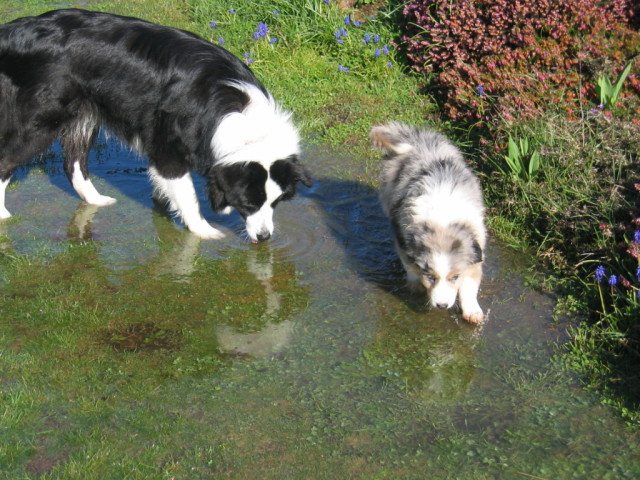 Dog in Heat?
QuestionLily and Jorge
QUESTION: Hello,
We have
Dog in Heat?
QuestionLily and Jorge
QUESTION: Hello,
We have
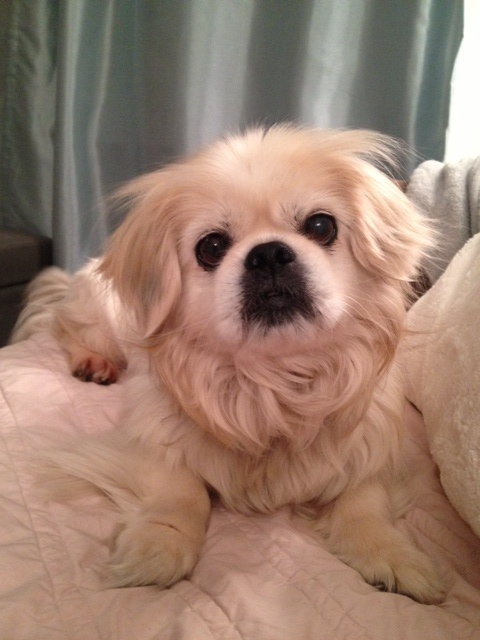 Nightmares?
Question
Beethoven
Hi Melissa, Ive had my very h
Nightmares?
Question
Beethoven
Hi Melissa, Ive had my very h
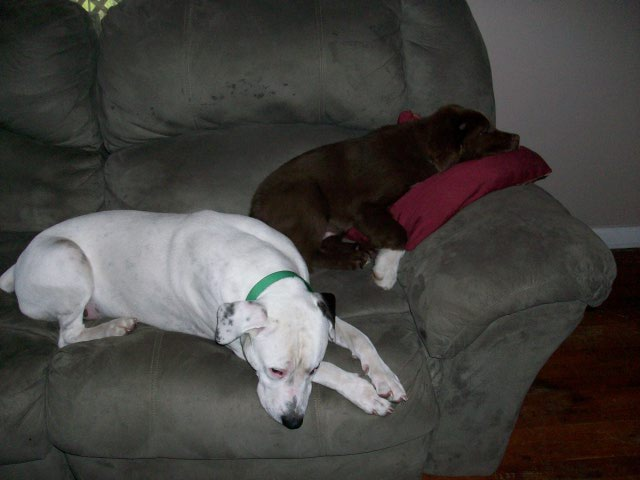 American Bulldog aggression
Question
Buddy and Rez
I have a 2 year old Ameri
American Bulldog aggression
Question
Buddy and Rez
I have a 2 year old Ameri
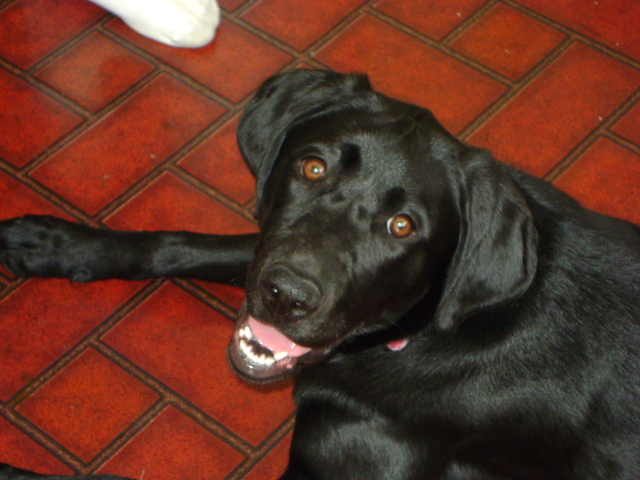 Black lab - 1 yr
QuestionSheba
QUESTION: My lab loves to bite her
Black lab - 1 yr
QuestionSheba
QUESTION: My lab loves to bite her
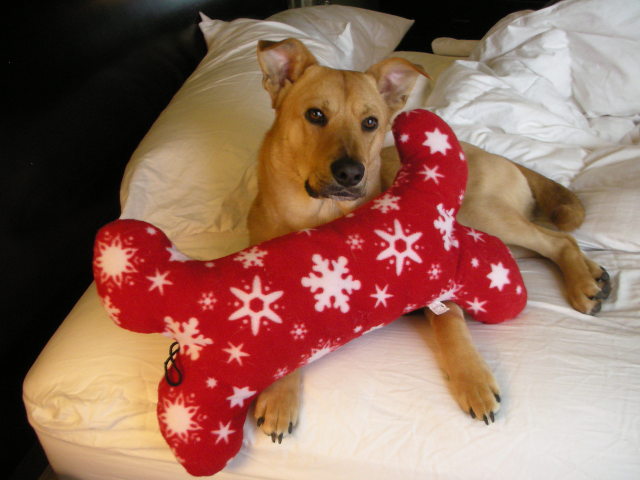 Very Scared Dog
Question
Happy
My dog is 17 months old and is a mixed b
Very Scared Dog
Question
Happy
My dog is 17 months old and is a mixed b